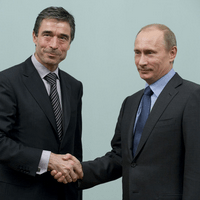Last week, the group of experts assisting with the drafting of NATO's new Strategic Concept released their final report, entitled "NATO 2020: Assured Security, Dynamic Engagement." In anticipation of the planned Strategic Concept, which is scheduled for approval at this November's NATO heads-of-state summit in Lisbon, the experts' report recommends how the alliance should define its purpose, nature, and fundamental security tasks in the contemporary and future security environment. Since last fall, the 12-member group, led by former U.S. Secretary of State Madeleine Albright, has convened a series of public and private meetings in various countries to discuss international security challenges, including several last week in Washington.
One of the earlier sessions occurred this February in Moscow. Albright and other members of the group met with Russia's Foreign Minister Sergey Lavrov, National Security Secretary Nikolay Patrushev, members of the Russian parliament, and other Russian security experts. Albright also delivered a speech on "the new NATO" at the Moscow State Institute of International Relations.
However, gauging from the Russian response to the final report, February's Moscow session evidently failed to overcome many Russian concerns about NATO's future development.

